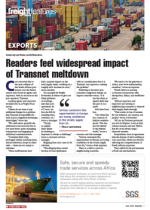Am id persistent hurdles in electricity and logistics, the Western Cape is steadfast in prioritising the tripling of exports by 2035, aiming to propel economic growth to new heights.According to Wesgro CEO Wrenelle Stander, the Growth for Jobs (G4J) strategy outlines the province's aim to achieve economic growth of 4- 6% over the next decade, with exports playing a pivotal role in this plan.Addressing infrastructure challenges, however, is critical to boosting economic revival and growth. Eskom, South Africa's power utility, has grappled with frequent power cuts due to ageing infrastructure unable to cope with demand. Concurrently, logistical bottlenecks within the port and rail systems have hindered the efficient transportation of crucial export commodities to their destinations. This subpar performance of South Africa's freight logistics network and unreliable power supply have not only hampered exports and business expansion but have also impeded efforts to reduce unemployment rates.“South Africa faces challenges,” said Stander. “These include deterioration in government finances, and a significant increase in government debt. The general elections have the potential to become a watershed moment in South African politics.”But, said Stander, the Western Cape economy continued to display resilience, coupled with innovation and good governance. “Wesgro will focus on specific and targeted measures to attract, facilitate, and support climate FDI. We will look to attract investment into energy resilience, including LNG, as well as the green transition, including renewables, green hydrogen, and water. Notwithstanding the importance of our traditional FDI source markets, ie, Europe, USA, UK and Africa, we will look to unlock new markets such as China, ASEAN, and the Middle East. We have a vested interest in ensuring that Western Cape businesses remain confident about the future of the province and are supported to increase investment. In addition, a green hydrogen Investment Promotion Plan will be developed that will inform the approach to capturing the Western Cape’s share of global green hydrogen investment,” she told Freight News.Stander said 2024 would see Wesgro further leverage technology and build on the extensive brand work that it had initiated over the last few years through ‘Made in the Cape’ and the Cape Trade Portal. “Strong relationships have been built with our long-standing export markets. We will continue to nurture these and, to grow even further; we will cast a wider net to include markets such as China, ASEAN, and the Middle East. Wesgro has continued to innovate in the way we approach trade. We have leveraged technology to connect more exporters with more buyers through the Cape Trade Portal and built capacity to ensure a deliberate focus on the services sector. Our aim is to ensure that Western Cape goods and services are synonymous with the values of quality, sustainability, and trust,” she said.Asked about challenges, Stander said the main concerns raised by investors and exporters were load shedding, the visa regime, crime, and the performance at the Port of Cape Town.Stander highlighted that to address these challenges, increasing private sector involvement was paramount, particularly in critical areas such as energy and logistics. She said increased collaborative efforts between the government and private sector in the Western Cape, nurturing an investment-friendly environment through streamlined processes and proactive support for investors, would bring about significant change, driving the province forward and boosting its export sector at large.

